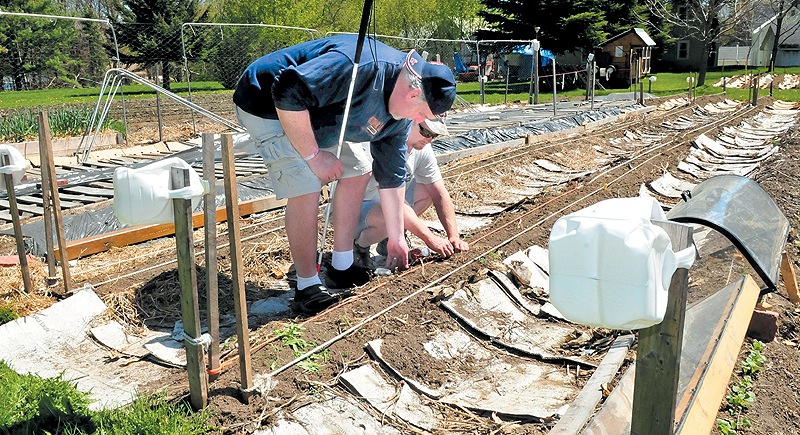FAIRFIELD – When 52-year-old Deon Lyons of Clinton lost his eyesight in 2010, he was ready to give up living.
With the help of his wife, Lynne, and state rehabilitation programs, he got through that first year or so adjusting to being totally blind, but his morale was low.
“My world fell apart,” Lyons said.
Then he met David Perry, 43, a visually impaired gardener who uses touch, sound and distinctive markers to plant and harvest a 2,800-square-foot vegetable garden in downtown Fairfield.
For Lyons, meeting Perry offered hope that he could go back to doing one of the things he enjoyed most — gardening.
“The first couple of years of my vision loss, I couldn’t even say the word ‘garden,’ because I would get sick to my stomach,” he said, remembering the large vegetable garden he had before he lost his eyesight. “One of the greatest joys I got out of my garden was being able to see things grow. Without that visual input, I couldn’t help think: ‘What’s the sense of having a garden anymore?’ “
Lyons and Perry met during a ride to Augusta to a work session in the Legislature about on a bill for people with disabilities, and they hit it off.
Perry said the men were just chatting when Lyons mentioned that he once had a garden and how he missed raising vegetables. Perry said he was doing just that — vegetable gardening with minimal eyesight — and a partnership was born.
Perry “relit that passion in me for gardening,” Lyons said. “Just knowing his drive and determination, that has put the hop back in my step. I’m very much looking forward to getting my knees dirty.”
During the past three years, Perry has navigated his garden by placing empty milk jugs to mark the width of each row. In each row are metal cans, which make different sounds, also marking location. There also are posts and stakes of different sizes and markings to tell him which row he is in and where he is in each row.
Perry, with the help of his wife, Julie, who helps him sort and plant the seeds, laid out each row with lengths of twine as guide lines — sight lines, as he calls them — running the full distance of a row. Plant placement is done along the guide lines with a 5- or 6-inch stick or the length of Perry’s hand separating each plant.
The garden rows are manicured in raised beds 6 to 10 inches tall, laid out in 10 rows, seven of them 68 feet long. The other rows are 5 feet long. Cardboard is placed between each row for weed control and to clearly separate the rows so Perry can tell where to walk, he said.
Lynne Lyons, who drives her husband to Perry’s garden on land behind Grover-Hinckley Post 14 of the American Legion, said her husband has changed dramatically because of the garden project.
“When my husband met Dave, it was like Dave awakened what my husband thought was dead to him, his love of gardening,” Lynne said. “Up until my husband lost his sight, he planted and harvested a large garden at our home in Clinton — all for me.”
Lyons has been visually impaired since he was 5 months old, when he lost his left eye to retinal cancer. He managed to work as a truck driver and lead a normal life with just one eye until the summer of 2010, when he lost vision in his right eye because of complications from the original cancer.
Perry said he also has been visually impaired his whole life from a disease, which progressed over the years. He was in the food service industry until the disease prevented him from working and driving.
Lyons said he first will learn Perry’s style of gardening and learn his way around the large garden.
“(I’m) basically going to be learning how to garden all over again,” Lyons said.
Perry agreed, saying Lyons will help him plant seeds, onion sets and seedlings during the next couple of weeks.
“I think it’s great, … what he’s done to help people and what he has done to inspire me to give me hope and to think being blind isn’t the end of my life,” Lyons said.
Perry said he welcomes the help from Lyons and looks forward to his new friend’s company while raising tomatoes, cabbage, onions and carrots. He said he can feed both families with the produce and still have enough to give away to neighbors and passers-by at a farm stand he sets up on Main Street in late summer.
“It’s my pleasure; we’ve become quick, pretty tight friends over the last year,” he said. “To me, it’s just a pleasure. That’s what this kind of thing is really about — you learn something, you hand it off, you hand it to somebody else.”
Doug Harlow can be contacted at 612-2367 or at:
dharlow@centralmaine.com
Send questions/comments to the editors.



Success. Please wait for the page to reload. If the page does not reload within 5 seconds, please refresh the page.
Enter your email and password to access comments.
Hi, to comment on stories you must . This profile is in addition to your subscription and website login.
Already have a commenting profile? .
Invalid username/password.
Please check your email to confirm and complete your registration.
Only subscribers are eligible to post comments. Please subscribe or login first for digital access. Here’s why.
Use the form below to reset your password. When you've submitted your account email, we will send an email with a reset code.